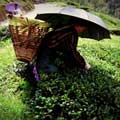My Life as A Tea Leaf - 凱聞
„Hui Gan 回甘, Hui Tian 回甜, Sheng Jin 生津, & Hui Yun 回韻…In literally term, Hui Gan, sometimes referred to as Hui Wei, is to reflect sweetly on a past event. Borrowing from the term 'to reflect', Hui Gan in tea is, simply put, a reflection on the sweetness of the tea - when one drink the tea, when the tea slides through the cavity of the mouth into the throat, there comes, after a short while, a sweetness that rises up from the throat. This sweetness is sometimes accompanied with a fragrance. Do not keep the upper and lower mouth pressed together when sipping tea, but create a cavity instead by lowering the jaw. Let the tea wash over the entire inside of the mouth, and then direct the tea to slide from the sides of the jaw into the throat. While holding the empty cavity, breathe out instead of in after you swallow the tea, there is warmth in the breath accompanied by a fragrance, and the same fragrance that rises up from the throat. This is Hui Gan.“
Quotes Tags: Pu-erh, China, Tea infusion, Experiencing tea
Theme
Tea by region
We will help you with tea selection.
Do you like quality loose tea?
We will help you to find the right one for you. Be inspired by tea ratings of other tea lovers. Rating stars could help you.


Review your cup of tea.
Review the tea you are drinking and help other tea lovers to find the right cup of tea.



Teas
2000 CNNP 7532 Tiepai
 1 review
1 reviewThis tea most closely resembles CNNP 7532, but we are labeling it as tiepai [pasted brand] because it is...
Lao Banzhang 2004 Bamboo Tube
 1 review
1 reviewLao Banzhang 2004 is a pu-erh pressed into bamboo tubes. Mighty and rich tea soup reminds us its great...
DaeJak 2014 ECO Korea
 1 review
1 reviewKorean green tea picked in the spring of 2014 in Hadong district, Jiri mountains. Grown and produced by an...
Quotes
„Bitterness
Broad leaf variety (Sinenesis Assamica) is high in natural constituents; polyphenols, caffeine,theine, etc. A particularly bitter flavour is a special characteristic of the Broad leaf variety, but it is important that it transforms quickly and does not linger. This is a mark of good quality Puer. NB there is a sub-variety in Yunnan - Var. ku cha which has different characteristics and does not transform in the same way.“



 Shops
Shops Share on Facebook
Share on Facebook












